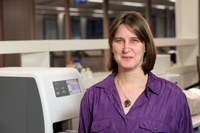
Associate Professor Therese Becker
Position:
- Circulating Tumor Cell Program Leader, Medical Oncology Group, University of New South Wales, Ingham Institute for Applied Medical Research
Credentials:
- A/Prof at UWS
Biography:
In 2013 I have been attracted to the Ingham Institute of Medical Research to establish the new Centre for Circulating Tumour Cell Diagnostics & Research (CCDR). We are investigating the use of liquid biopsies to guide prognosis and therapy as well as monitor cancer progression and relapse. We are isolating circulating tumour cells CTCs using the IsoFlux platform for CTCs and various assays to isolate circulating nucleic acids (ctNAs) and have established assays to analyse CTC numbers, gene-amplification including AR, oncogenic driver- or resistance driving point mutations, expression of gene variants such as the AR-v7 fromCTCs and plasma samples.
We are also focussing on the isolation of potentially more aggressive CTCs and are currently preparing a manuscript detailing the improved isolation and identification of CTCs that show markers of epithelial to mesenchymal transition (EMT).
Between 1999 and 2013 I worked as a postdoc at the Westmead Millennium Institute and analysed the biological basis of the melanoma predisposition gene and tumour suppressor, p16INK4a and melanoma associated oncogenic driver mutations in BRAF and NRAS. With the development of targeted BRAF inhibitors we focussed on relapse associated resistance mechanisms and identified novel mutations in the MAPK pathway as well as BRAF amplification as BRAF-inhibitor resistance mechanisms in established resistant melanoma cell lines and in patient tissue upon relapse.
Prior to this I developed p16INK4a inducible melanoma cell lines to study the functional significance of p16INK4a and of melanoma associated germline mutations.
Best publications:
- Caixeiro, N.J., Kienzle, N., Lim, S. H., Spring, K.J., Tognela, A., Scott, K. F., de Souza, P., Becker, T. M. Circulating tumour cells-a bona fide cause of metastatic cancer Cancer Metastasis Reviews, 2014, 33: 747-756
-
Rizos, H., Menzies, A.M., Pupo, G., Carlino, M.S., Fung, C., Hyman, J. Haydu, L E., Mijatov, B., Becker, T.M., Boyd, SC., Howle, J., Saw, R., Thompson, J.F., Kefford, R.F., Scolyer, R.A., Long, G.V. BRAF-inhibitor resistance mechanisms in metastatic melanoma; spectrum and clinical impact Clinical Cancer Research, 2014, 20: 1965-1977
-
Becker, T.M., Caixeiro, N.J., Lim, S.H., Tognela, A., Kienzle, N., Scott, K.F., Spring, K.J., de Souza, P. New frontiers in circulating tumor cell analysis - a reference guide for biomolecular profiling towards translational clinical use. Int J Cancer, 2014, 134: 2523-33
-
Becker, T.M., Philipsz, S., Mijatov, B., Gowrishankar, K., Snoyman, S., Pupo, G.M., Scolyer, R.A., Mann, G.J., Kefford, R.F., Zhang X.D., Rizos, H. Mutant B-RAF-Mcl-1 survival signaling depends on the STAT3 transcription factor. Oncogene, 2014, 33: 1158-1166
-
Boyd, S.C., Mijatov, B., Pupo, G.M., Tran, S., Gowrishankar, K., Shaw, H.M., Goding, C.R., Scolyer, R.A., Mann, G.J., Kefford, R.F., Rizos. H., Becker, T.M. Oncogenic B-RAFV600E signalling induces the T-box3 transcriptional repressor to repress E-cadherin and enhance melanoma cell invasion. J Invest Dermatol, 2013, 133: 1269-1277
-
Becker, T.M., Philipz, S., Scurr, L.L., Fung, C., Haferkamp, S., Kefford, R.F., Rizos, H. Oncogenic B-RAFV600E promotes anchorage-independent survival of human melanocytes. J Invest Dermatol, 2010, 130: 2144-2147
-
Scurr, L.L., Pupo, G.M., Becker, T.M., Lai, K., Schrama, D., Haferkamp, S., Irvine, M., Scolyer, R.A., Mann, G.J., Becker, J.C., Kefford R.F., Rizos H. IGFBP7 is dispensable for B-RAF induced senescence. Cell, 2010, 141:4, 717-727
-
Becker, T.M., Haferkamp, S., Dijkstra, M.K., Scurr, L.L., Frausto, M., Diefenbach, E., Scolyer, R.A., Reisman, D.N., Mann, G.J., Kefford,R.F., Rizos, H. The chromatin remodelling factor BRG1 is a novel binding partner of the tumor suppressor p16INK4a. Molecular Cancer, 2009, 8:4
-
Haferkamp S., Becker T.M., Scurr L.L., Kefford R.F., Rizos H. p16INK4a-induced senescence is disabled by melanoma-associated mutations. Aging Cell 2008, 7: 733-745
-
Becker, T.M., Rizos, H., de la Pena, A, Leclerq, I,A, Woodruff, S., Kefford, R.F., and Mann G.J. Impaired inhibition of NF-kB dependent transcription by melanoma associated p16INK4a mutations. Biochemical & Biophysical Research Communications, 2005, 332: 873-879
CTCs, ctDNA, ctRNA, biomarker, driver mutation.


